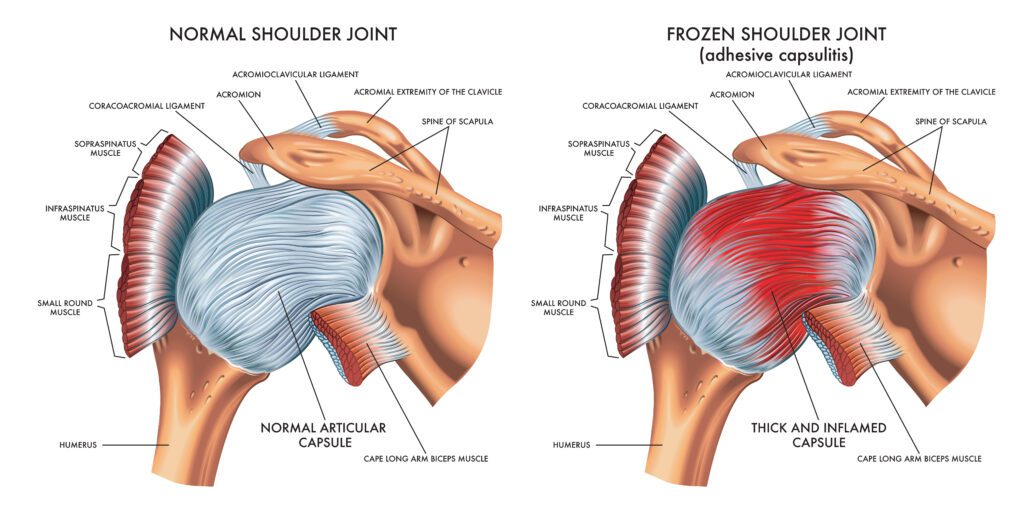What is it?
Frozen shoulder, or adhesive capsulitis, is a condition where the shoulder joint becomes stiff and painful, limiting your range of motion. It happens when the capsule of connective tissue surrounding the shoulder thickens and tightens, restricting movement.

Who is at risk?
- Adults aged 40–60 (especially women)
- People with diabetes (risk up to 2–4 times higher)
- Those who have had shoulder immobility due to injury or surgery
What are some common symptoms?
Symptoms develop gradually and typically follow 3 stages:
- Freezing stage (painful phase):
- Increasing pain and loss of motion
- 6 weeks to 9 months
- Frozen stage (stiffness phase):
- Pain may lessen, but movement is severely limited
- 4 to 12 months
- Thawing stage (recovery phase):
- Motion gradually improves
- 6 months to 2 years
Causes?
Often the cause is unknown (idiopathic), but it can develop after:
- Injury or surgery
- Immobility (e.g. after arm fracture or rotator cuff tear)
- Medical conditions, especially:
- Diabetes (strongly linked)
- Thyroid disorders
- Parkinson’s disease
- Heart disease
How is it diagnosed?
Diagnosis is usually based on:
- Medical history and symptoms
- Physical exam (range of motion tests)
- Imaging tests (X-rays or MRI) to rule out other causes (like arthritis or rotator cuff tears)
Do I need surgery?
In most cases, surgery is not required, however there are cases where it may be recommended after other non-surgical treatments have not been effective and pain/disability is still severe and impacting daily life and function.
How long will recovery take?
Most people recover within 1.5 to 3 years. Recovery is gradual and requires consistent therapy.
Can it come back?
It usually affects only one shoulder, but the other shoulder may be affected later. Recurrence in the same shoulder is rare.
What does treatment look like?
- Physiotherapy
- Dependent on stage, includes: pain management, gentle ROM exercises, education regarding posture and lifestyle, manual therapy/massage, strengthening, functional retraining
- NSAIDs (like ibuprofen)
- Steroid injections
- Heat or ice therapy
- Joint distension (injecting sterile fluid to stretch the capsule)

Surgical (rare, for severe cases):
- Manipulation under anaesthesia (MUA)
- Arthroscopic capsular release
How can I prevent this?
- Keep moving
- Do daily stretches
- Manage underlying conditions (e.g. diabetes, thyroid disorders, heart disease)
- Act quickly after injury
- Avoid excessive rest/inactivity
- Strengthen and stabilise around shoulder muscles